Evaluating ICC's Objectives in Addressing Global Conflict & Justice
VerifiedAdded on 2023/06/11
|14
|5208
|273
Essay
AI Summary
This essay critically examines the extent to which the objectives of the International Criminal Court (ICC) are met in responding to global conflicts and bringing those responsible for atrocity crimes to justice. It discusses the historical context of the ICC's formation, its structure, jurisdiction, and notable cases. The essay also delves into the debate over whether the ICC should be granted universal jurisdiction to act independently without referrals from the UN Security Council or State Parties, analyzing the complexities and challenges associated with such a concept. The analysis encompasses the ICC's successes, limitations, and ongoing struggles in achieving its mandate of combating impunity and promoting the rule of law on a global scale. Desklib offers similar essays and study resources for students.
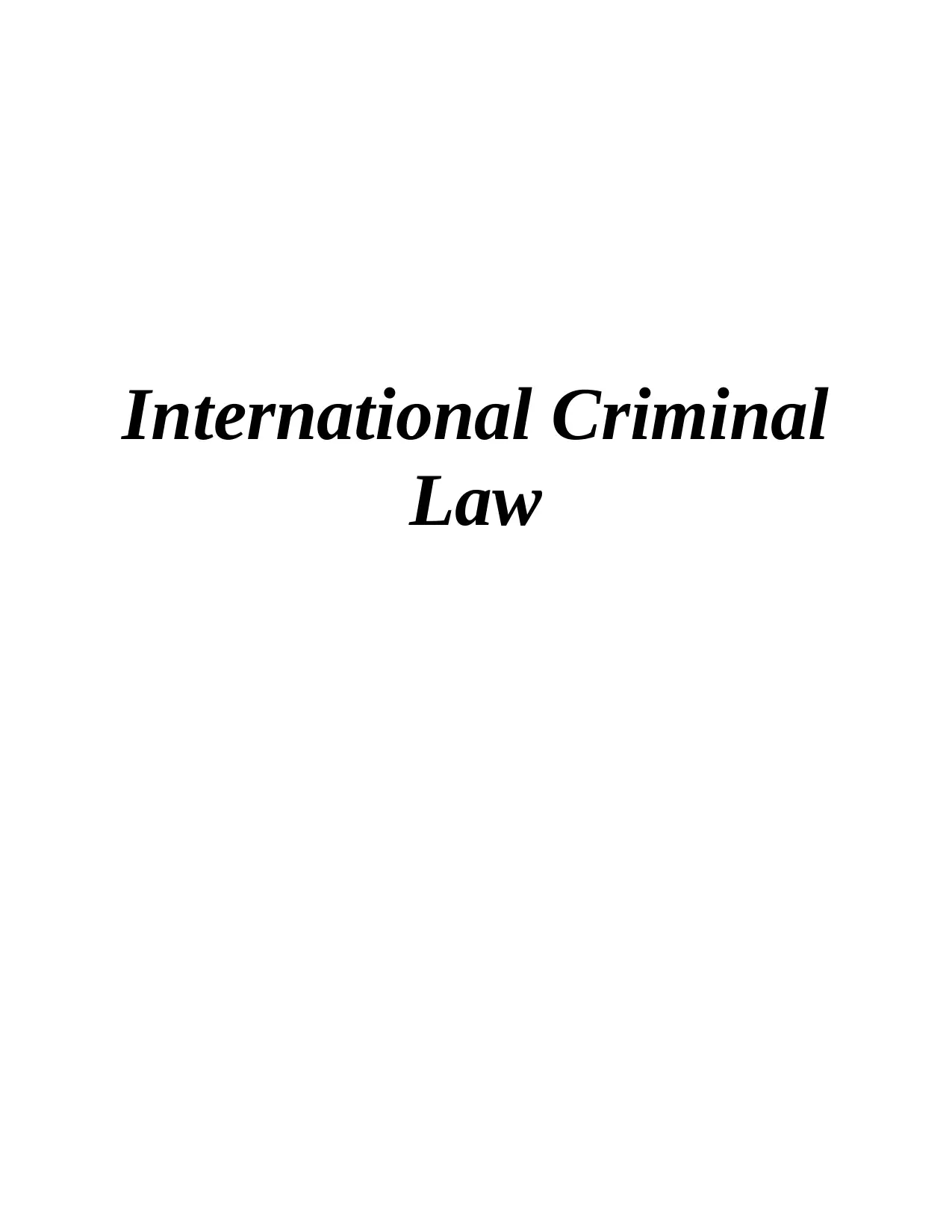
International Criminal
Law
Law
Paraphrase This Document
Need a fresh take? Get an instant paraphrase of this document with our AI Paraphraser
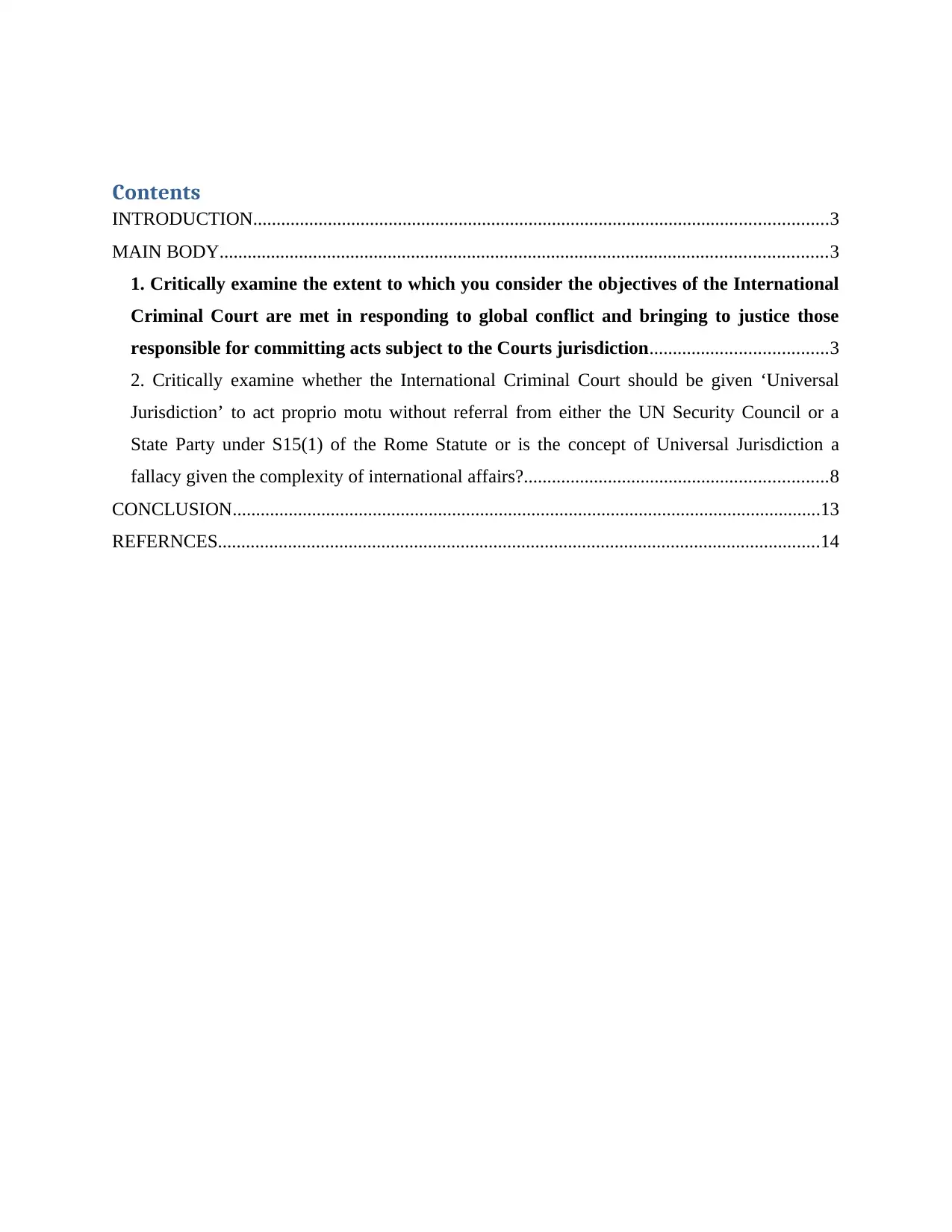
Contents
INTRODUCTION...........................................................................................................................3
MAIN BODY..................................................................................................................................3
1. Critically examine the extent to which you consider the objectives of the International
Criminal Court are met in responding to global conflict and bringing to justice those
responsible for committing acts subject to the Courts jurisdiction......................................3
2. Critically examine whether the International Criminal Court should be given ‘Universal
Jurisdiction’ to act proprio motu without referral from either the UN Security Council or a
State Party under S15(1) of the Rome Statute or is the concept of Universal Jurisdiction a
fallacy given the complexity of international affairs?.................................................................8
CONCLUSION..............................................................................................................................13
REFERNCES.................................................................................................................................14
INTRODUCTION...........................................................................................................................3
MAIN BODY..................................................................................................................................3
1. Critically examine the extent to which you consider the objectives of the International
Criminal Court are met in responding to global conflict and bringing to justice those
responsible for committing acts subject to the Courts jurisdiction......................................3
2. Critically examine whether the International Criminal Court should be given ‘Universal
Jurisdiction’ to act proprio motu without referral from either the UN Security Council or a
State Party under S15(1) of the Rome Statute or is the concept of Universal Jurisdiction a
fallacy given the complexity of international affairs?.................................................................8
CONCLUSION..............................................................................................................................13
REFERNCES.................................................................................................................................14
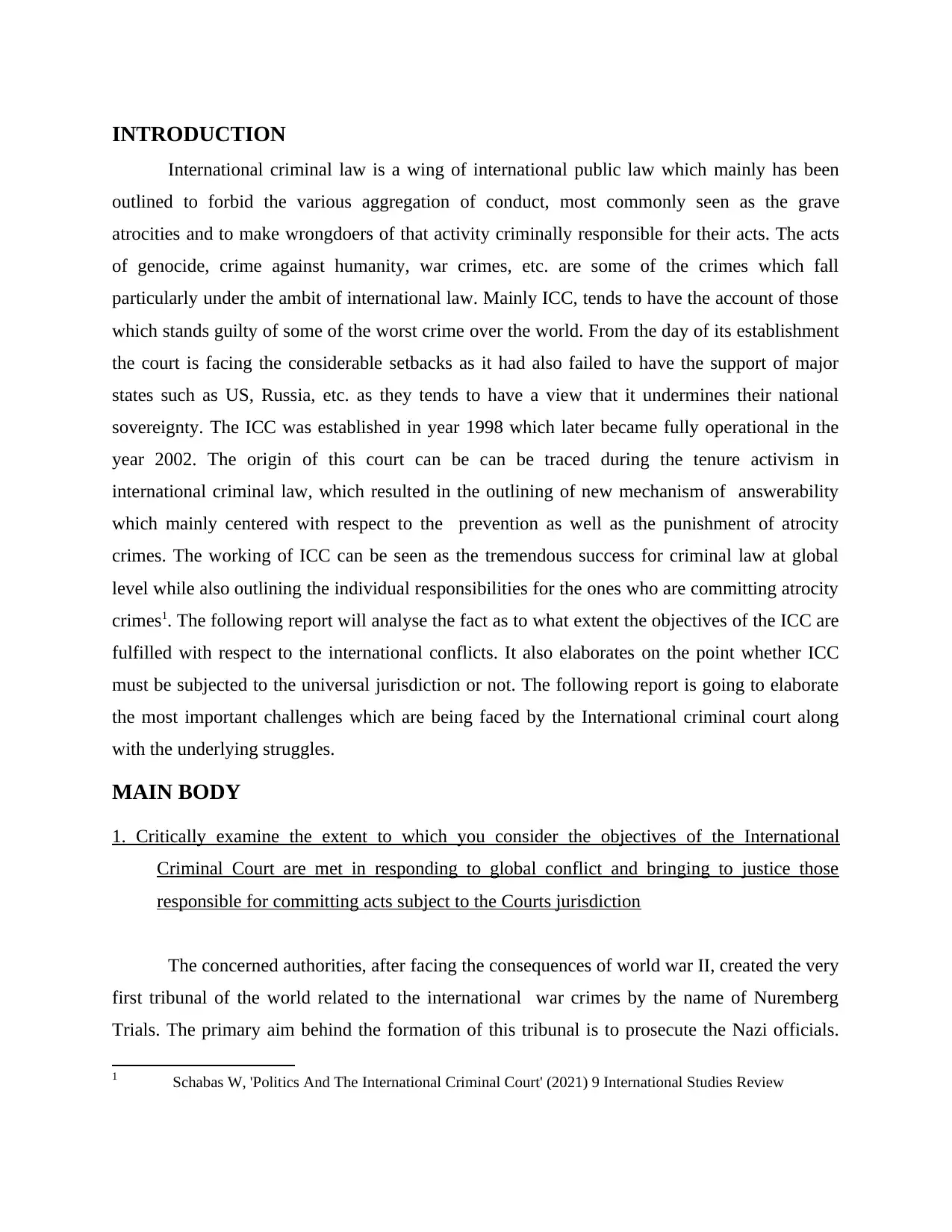
INTRODUCTION
International criminal law is a wing of international public law which mainly has been
outlined to forbid the various aggregation of conduct, most commonly seen as the grave
atrocities and to make wrongdoers of that activity criminally responsible for their acts. The acts
of genocide, crime against humanity, war crimes, etc. are some of the crimes which fall
particularly under the ambit of international law. Mainly ICC, tends to have the account of those
which stands guilty of some of the worst crime over the world. From the day of its establishment
the court is facing the considerable setbacks as it had also failed to have the support of major
states such as US, Russia, etc. as they tends to have a view that it undermines their national
sovereignty. The ICC was established in year 1998 which later became fully operational in the
year 2002. The origin of this court can be can be traced during the tenure activism in
international criminal law, which resulted in the outlining of new mechanism of answerability
which mainly centered with respect to the prevention as well as the punishment of atrocity
crimes. The working of ICC can be seen as the tremendous success for criminal law at global
level while also outlining the individual responsibilities for the ones who are committing atrocity
crimes1. The following report will analyse the fact as to what extent the objectives of the ICC are
fulfilled with respect to the international conflicts. It also elaborates on the point whether ICC
must be subjected to the universal jurisdiction or not. The following report is going to elaborate
the most important challenges which are being faced by the International criminal court along
with the underlying struggles.
MAIN BODY
1. Critically examine the extent to which you consider the objectives of the International
Criminal Court are met in responding to global conflict and bringing to justice those
responsible for committing acts subject to the Courts jurisdiction
The concerned authorities, after facing the consequences of world war II, created the very
first tribunal of the world related to the international war crimes by the name of Nuremberg
Trials. The primary aim behind the formation of this tribunal is to prosecute the Nazi officials.
1 Schabas W, 'Politics And The International Criminal Court' (2021) 9 International Studies Review
International criminal law is a wing of international public law which mainly has been
outlined to forbid the various aggregation of conduct, most commonly seen as the grave
atrocities and to make wrongdoers of that activity criminally responsible for their acts. The acts
of genocide, crime against humanity, war crimes, etc. are some of the crimes which fall
particularly under the ambit of international law. Mainly ICC, tends to have the account of those
which stands guilty of some of the worst crime over the world. From the day of its establishment
the court is facing the considerable setbacks as it had also failed to have the support of major
states such as US, Russia, etc. as they tends to have a view that it undermines their national
sovereignty. The ICC was established in year 1998 which later became fully operational in the
year 2002. The origin of this court can be can be traced during the tenure activism in
international criminal law, which resulted in the outlining of new mechanism of answerability
which mainly centered with respect to the prevention as well as the punishment of atrocity
crimes. The working of ICC can be seen as the tremendous success for criminal law at global
level while also outlining the individual responsibilities for the ones who are committing atrocity
crimes1. The following report will analyse the fact as to what extent the objectives of the ICC are
fulfilled with respect to the international conflicts. It also elaborates on the point whether ICC
must be subjected to the universal jurisdiction or not. The following report is going to elaborate
the most important challenges which are being faced by the International criminal court along
with the underlying struggles.
MAIN BODY
1. Critically examine the extent to which you consider the objectives of the International
Criminal Court are met in responding to global conflict and bringing to justice those
responsible for committing acts subject to the Courts jurisdiction
The concerned authorities, after facing the consequences of world war II, created the very
first tribunal of the world related to the international war crimes by the name of Nuremberg
Trials. The primary aim behind the formation of this tribunal is to prosecute the Nazi officials.
1 Schabas W, 'Politics And The International Criminal Court' (2021) 9 International Studies Review
⊘ This is a preview!⊘
Do you want full access?
Subscribe today to unlock all pages.

Trusted by 1+ million students worldwide
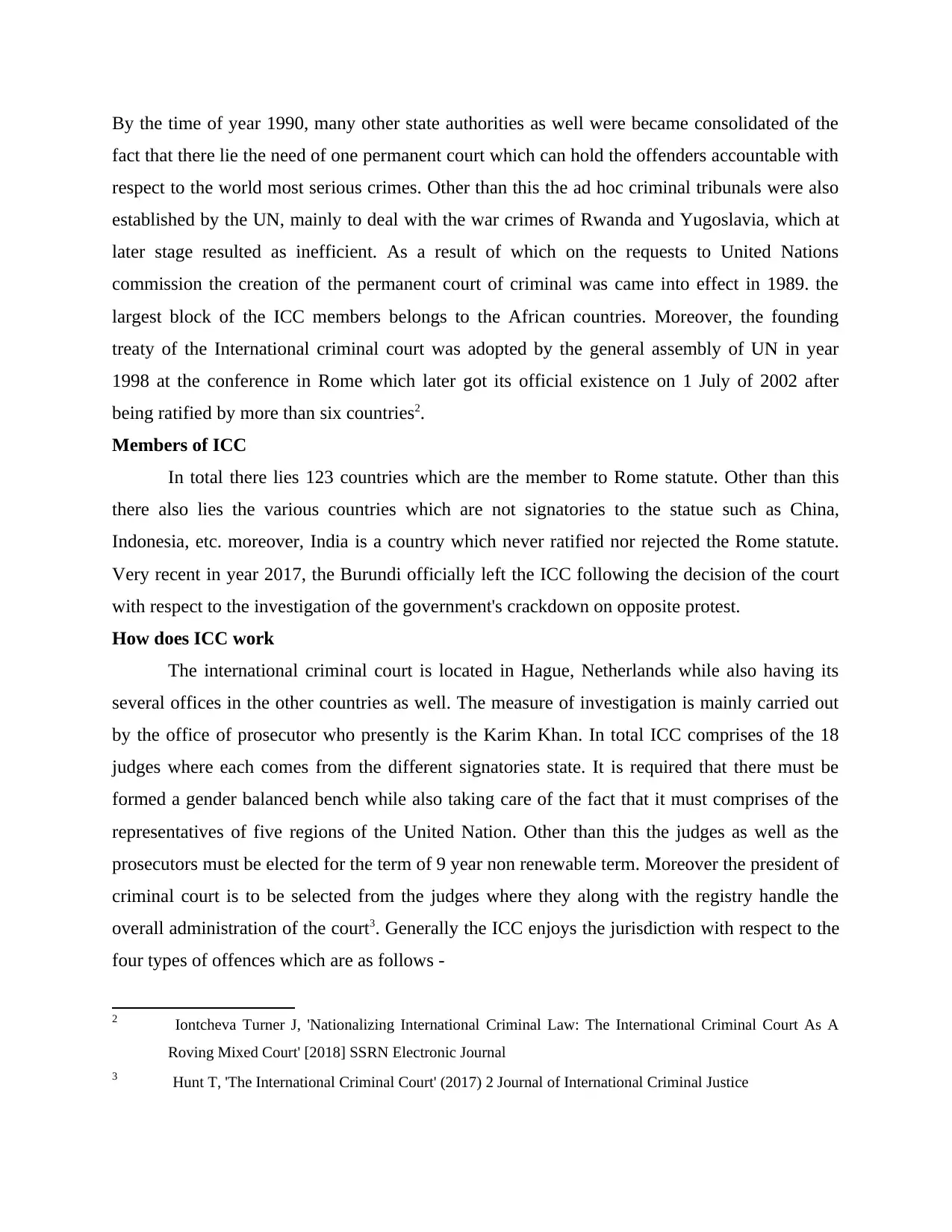
By the time of year 1990, many other state authorities as well were became consolidated of the
fact that there lie the need of one permanent court which can hold the offenders accountable with
respect to the world most serious crimes. Other than this the ad hoc criminal tribunals were also
established by the UN, mainly to deal with the war crimes of Rwanda and Yugoslavia, which at
later stage resulted as inefficient. As a result of which on the requests to United Nations
commission the creation of the permanent court of criminal was came into effect in 1989. the
largest block of the ICC members belongs to the African countries. Moreover, the founding
treaty of the International criminal court was adopted by the general assembly of UN in year
1998 at the conference in Rome which later got its official existence on 1 July of 2002 after
being ratified by more than six countries2.
Members of ICC
In total there lies 123 countries which are the member to Rome statute. Other than this
there also lies the various countries which are not signatories to the statue such as China,
Indonesia, etc. moreover, India is a country which never ratified nor rejected the Rome statute.
Very recent in year 2017, the Burundi officially left the ICC following the decision of the court
with respect to the investigation of the government's crackdown on opposite protest.
How does ICC work
The international criminal court is located in Hague, Netherlands while also having its
several offices in the other countries as well. The measure of investigation is mainly carried out
by the office of prosecutor who presently is the Karim Khan. In total ICC comprises of the 18
judges where each comes from the different signatories state. It is required that there must be
formed a gender balanced bench while also taking care of the fact that it must comprises of the
representatives of five regions of the United Nation. Other than this the judges as well as the
prosecutors must be elected for the term of 9 year non renewable term. Moreover the president of
criminal court is to be selected from the judges where they along with the registry handle the
overall administration of the court3. Generally the ICC enjoys the jurisdiction with respect to the
four types of offences which are as follows -
2 Iontcheva Turner J, 'Nationalizing International Criminal Law: The International Criminal Court As A
Roving Mixed Court' [2018] SSRN Electronic Journal
3 Hunt T, 'The International Criminal Court' (2017) 2 Journal of International Criminal Justice
fact that there lie the need of one permanent court which can hold the offenders accountable with
respect to the world most serious crimes. Other than this the ad hoc criminal tribunals were also
established by the UN, mainly to deal with the war crimes of Rwanda and Yugoslavia, which at
later stage resulted as inefficient. As a result of which on the requests to United Nations
commission the creation of the permanent court of criminal was came into effect in 1989. the
largest block of the ICC members belongs to the African countries. Moreover, the founding
treaty of the International criminal court was adopted by the general assembly of UN in year
1998 at the conference in Rome which later got its official existence on 1 July of 2002 after
being ratified by more than six countries2.
Members of ICC
In total there lies 123 countries which are the member to Rome statute. Other than this
there also lies the various countries which are not signatories to the statue such as China,
Indonesia, etc. moreover, India is a country which never ratified nor rejected the Rome statute.
Very recent in year 2017, the Burundi officially left the ICC following the decision of the court
with respect to the investigation of the government's crackdown on opposite protest.
How does ICC work
The international criminal court is located in Hague, Netherlands while also having its
several offices in the other countries as well. The measure of investigation is mainly carried out
by the office of prosecutor who presently is the Karim Khan. In total ICC comprises of the 18
judges where each comes from the different signatories state. It is required that there must be
formed a gender balanced bench while also taking care of the fact that it must comprises of the
representatives of five regions of the United Nation. Other than this the judges as well as the
prosecutors must be elected for the term of 9 year non renewable term. Moreover the president of
criminal court is to be selected from the judges where they along with the registry handle the
overall administration of the court3. Generally the ICC enjoys the jurisdiction with respect to the
four types of offences which are as follows -
2 Iontcheva Turner J, 'Nationalizing International Criminal Law: The International Criminal Court As A
Roving Mixed Court' [2018] SSRN Electronic Journal
3 Hunt T, 'The International Criminal Court' (2017) 2 Journal of International Criminal Justice
Paraphrase This Document
Need a fresh take? Get an instant paraphrase of this document with our AI Paraphraser
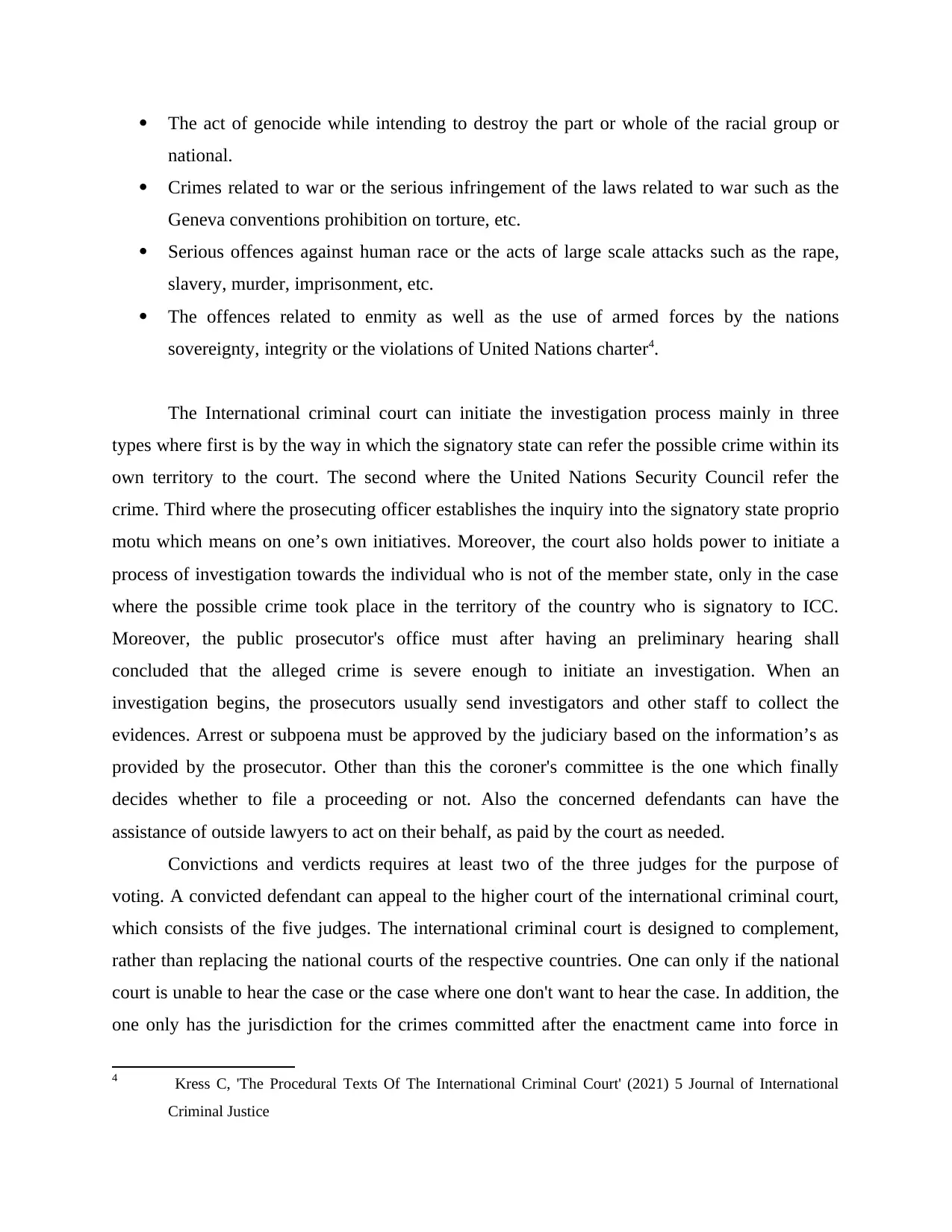
The act of genocide while intending to destroy the part or whole of the racial group or
national.
Crimes related to war or the serious infringement of the laws related to war such as the
Geneva conventions prohibition on torture, etc.
Serious offences against human race or the acts of large scale attacks such as the rape,
slavery, murder, imprisonment, etc.
The offences related to enmity as well as the use of armed forces by the nations
sovereignty, integrity or the violations of United Nations charter4.
The International criminal court can initiate the investigation process mainly in three
types where first is by the way in which the signatory state can refer the possible crime within its
own territory to the court. The second where the United Nations Security Council refer the
crime. Third where the prosecuting officer establishes the inquiry into the signatory state proprio
motu which means on one’s own initiatives. Moreover, the court also holds power to initiate a
process of investigation towards the individual who is not of the member state, only in the case
where the possible crime took place in the territory of the country who is signatory to ICC.
Moreover, the public prosecutor's office must after having an preliminary hearing shall
concluded that the alleged crime is severe enough to initiate an investigation. When an
investigation begins, the prosecutors usually send investigators and other staff to collect the
evidences. Arrest or subpoena must be approved by the judiciary based on the information’s as
provided by the prosecutor. Other than this the coroner's committee is the one which finally
decides whether to file a proceeding or not. Also the concerned defendants can have the
assistance of outside lawyers to act on their behalf, as paid by the court as needed.
Convictions and verdicts requires at least two of the three judges for the purpose of
voting. A convicted defendant can appeal to the higher court of the international criminal court,
which consists of the five judges. The international criminal court is designed to complement,
rather than replacing the national courts of the respective countries. One can only if the national
court is unable to hear the case or the case where one don't want to hear the case. In addition, the
one only has the jurisdiction for the crimes committed after the enactment came into force in
4 Kress C, 'The Procedural Texts Of The International Criminal Court' (2021) 5 Journal of International
Criminal Justice
national.
Crimes related to war or the serious infringement of the laws related to war such as the
Geneva conventions prohibition on torture, etc.
Serious offences against human race or the acts of large scale attacks such as the rape,
slavery, murder, imprisonment, etc.
The offences related to enmity as well as the use of armed forces by the nations
sovereignty, integrity or the violations of United Nations charter4.
The International criminal court can initiate the investigation process mainly in three
types where first is by the way in which the signatory state can refer the possible crime within its
own territory to the court. The second where the United Nations Security Council refer the
crime. Third where the prosecuting officer establishes the inquiry into the signatory state proprio
motu which means on one’s own initiatives. Moreover, the court also holds power to initiate a
process of investigation towards the individual who is not of the member state, only in the case
where the possible crime took place in the territory of the country who is signatory to ICC.
Moreover, the public prosecutor's office must after having an preliminary hearing shall
concluded that the alleged crime is severe enough to initiate an investigation. When an
investigation begins, the prosecutors usually send investigators and other staff to collect the
evidences. Arrest or subpoena must be approved by the judiciary based on the information’s as
provided by the prosecutor. Other than this the coroner's committee is the one which finally
decides whether to file a proceeding or not. Also the concerned defendants can have the
assistance of outside lawyers to act on their behalf, as paid by the court as needed.
Convictions and verdicts requires at least two of the three judges for the purpose of
voting. A convicted defendant can appeal to the higher court of the international criminal court,
which consists of the five judges. The international criminal court is designed to complement,
rather than replacing the national courts of the respective countries. One can only if the national
court is unable to hear the case or the case where one don't want to hear the case. In addition, the
one only has the jurisdiction for the crimes committed after the enactment came into force in
4 Kress C, 'The Procedural Texts Of The International Criminal Court' (2021) 5 Journal of International
Criminal Justice
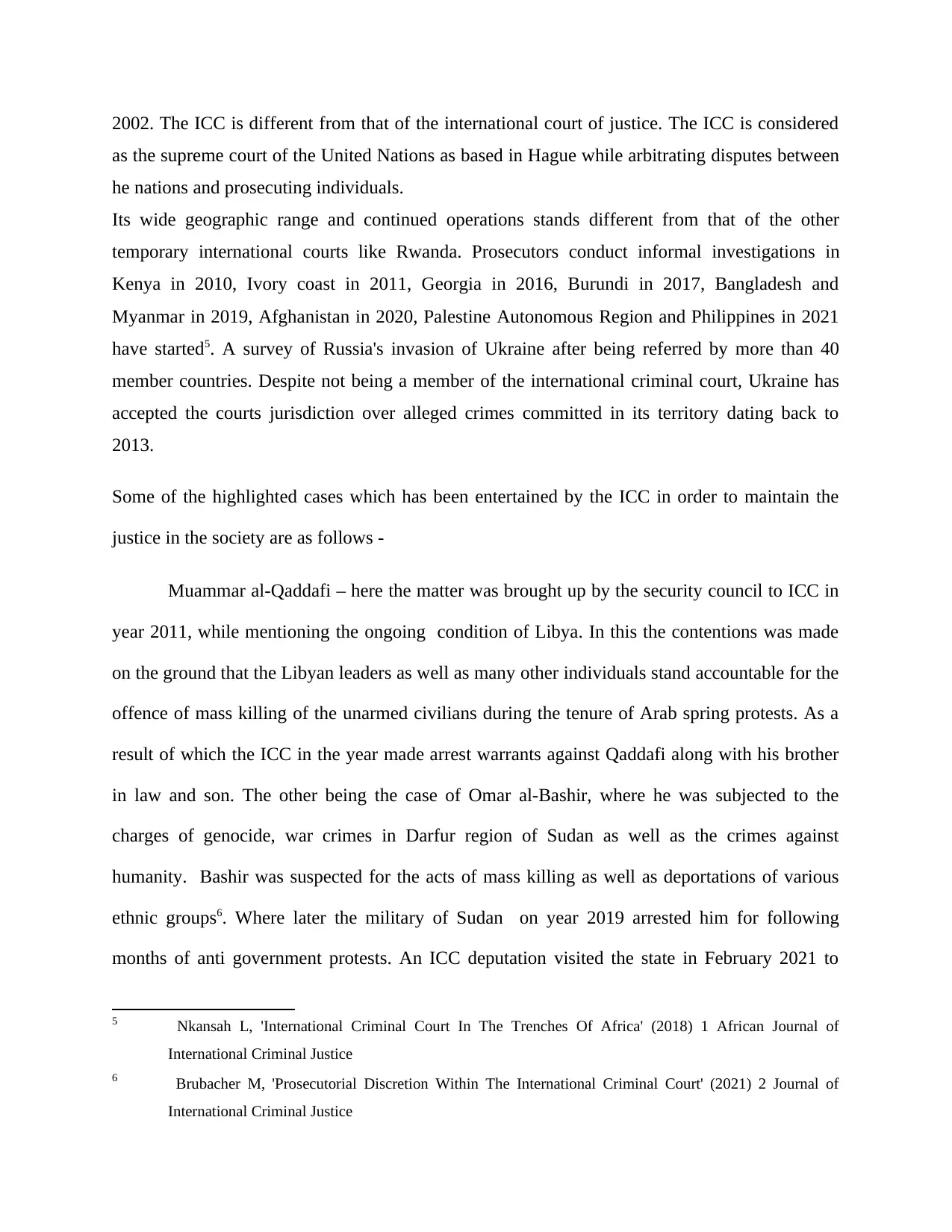
2002. The ICC is different from that of the international court of justice. The ICC is considered
as the supreme court of the United Nations as based in Hague while arbitrating disputes between
he nations and prosecuting individuals.
Its wide geographic range and continued operations stands different from that of the other
temporary international courts like Rwanda. Prosecutors conduct informal investigations in
Kenya in 2010, Ivory coast in 2011, Georgia in 2016, Burundi in 2017, Bangladesh and
Myanmar in 2019, Afghanistan in 2020, Palestine Autonomous Region and Philippines in 2021
have started5. A survey of Russia's invasion of Ukraine after being referred by more than 40
member countries. Despite not being a member of the international criminal court, Ukraine has
accepted the courts jurisdiction over alleged crimes committed in its territory dating back to
2013.
Some of the highlighted cases which has been entertained by the ICC in order to maintain the
justice in the society are as follows -
Muammar al-Qaddafi – here the matter was brought up by the security council to ICC in
year 2011, while mentioning the ongoing condition of Libya. In this the contentions was made
on the ground that the Libyan leaders as well as many other individuals stand accountable for the
offence of mass killing of the unarmed civilians during the tenure of Arab spring protests. As a
result of which the ICC in the year made arrest warrants against Qaddafi along with his brother
in law and son. The other being the case of Omar al-Bashir, where he was subjected to the
charges of genocide, war crimes in Darfur region of Sudan as well as the crimes against
humanity. Bashir was suspected for the acts of mass killing as well as deportations of various
ethnic groups6. Where later the military of Sudan on year 2019 arrested him for following
months of anti government protests. An ICC deputation visited the state in February 2021 to
5 Nkansah L, 'International Criminal Court In The Trenches Of Africa' (2018) 1 African Journal of
International Criminal Justice
6 Brubacher M, 'Prosecutorial Discretion Within The International Criminal Court' (2021) 2 Journal of
International Criminal Justice
as the supreme court of the United Nations as based in Hague while arbitrating disputes between
he nations and prosecuting individuals.
Its wide geographic range and continued operations stands different from that of the other
temporary international courts like Rwanda. Prosecutors conduct informal investigations in
Kenya in 2010, Ivory coast in 2011, Georgia in 2016, Burundi in 2017, Bangladesh and
Myanmar in 2019, Afghanistan in 2020, Palestine Autonomous Region and Philippines in 2021
have started5. A survey of Russia's invasion of Ukraine after being referred by more than 40
member countries. Despite not being a member of the international criminal court, Ukraine has
accepted the courts jurisdiction over alleged crimes committed in its territory dating back to
2013.
Some of the highlighted cases which has been entertained by the ICC in order to maintain the
justice in the society are as follows -
Muammar al-Qaddafi – here the matter was brought up by the security council to ICC in
year 2011, while mentioning the ongoing condition of Libya. In this the contentions was made
on the ground that the Libyan leaders as well as many other individuals stand accountable for the
offence of mass killing of the unarmed civilians during the tenure of Arab spring protests. As a
result of which the ICC in the year made arrest warrants against Qaddafi along with his brother
in law and son. The other being the case of Omar al-Bashir, where he was subjected to the
charges of genocide, war crimes in Darfur region of Sudan as well as the crimes against
humanity. Bashir was suspected for the acts of mass killing as well as deportations of various
ethnic groups6. Where later the military of Sudan on year 2019 arrested him for following
months of anti government protests. An ICC deputation visited the state in February 2021 to
5 Nkansah L, 'International Criminal Court In The Trenches Of Africa' (2018) 1 African Journal of
International Criminal Justice
6 Brubacher M, 'Prosecutorial Discretion Within The International Criminal Court' (2021) 2 Journal of
International Criminal Justice
⊘ This is a preview!⊘
Do you want full access?
Subscribe today to unlock all pages.

Trusted by 1+ million students worldwide
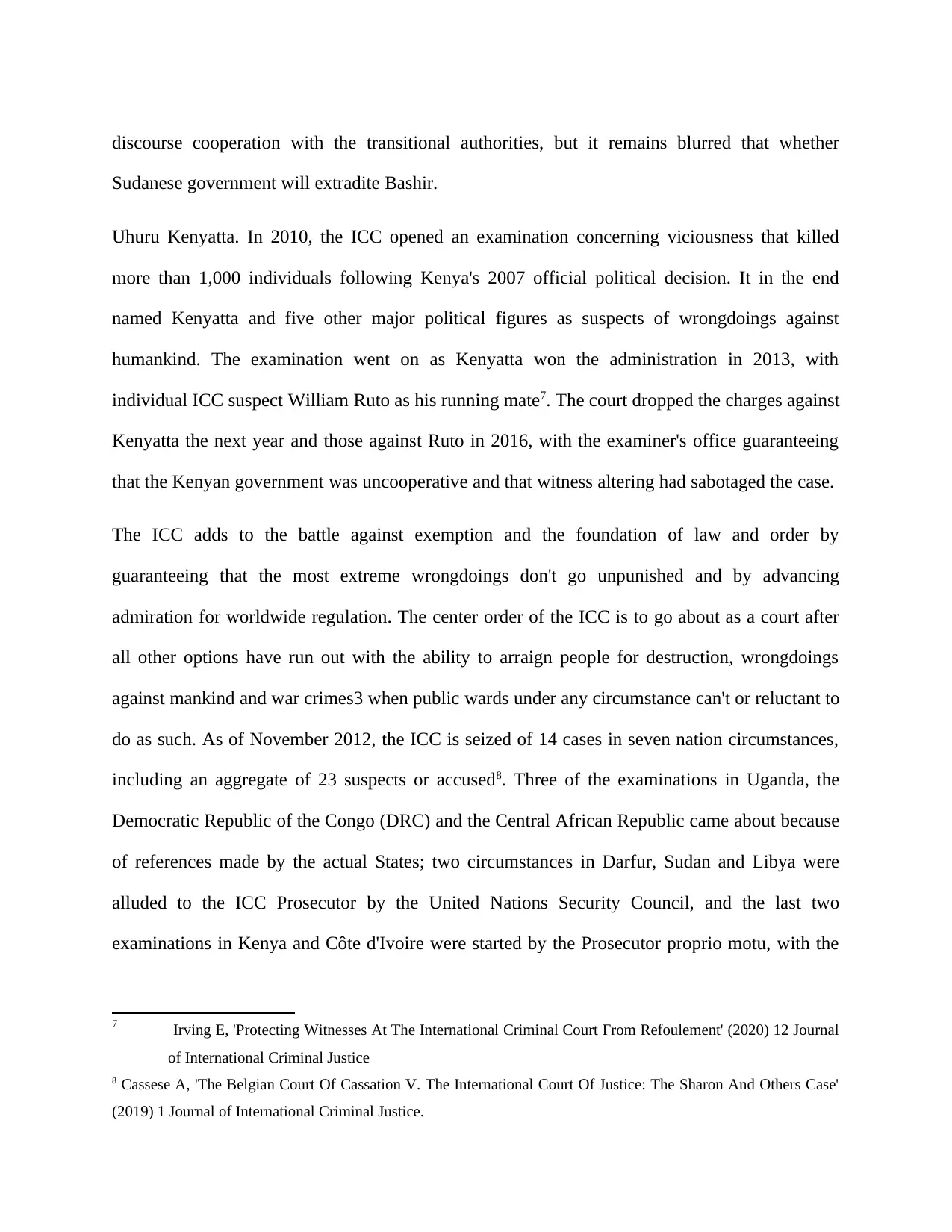
discourse cooperation with the transitional authorities, but it remains blurred that whether
Sudanese government will extradite Bashir.
Uhuru Kenyatta. In 2010, the ICC opened an examination concerning viciousness that killed
more than 1,000 individuals following Kenya's 2007 official political decision. It in the end
named Kenyatta and five other major political figures as suspects of wrongdoings against
humankind. The examination went on as Kenyatta won the administration in 2013, with
individual ICC suspect William Ruto as his running mate7. The court dropped the charges against
Kenyatta the next year and those against Ruto in 2016, with the examiner's office guaranteeing
that the Kenyan government was uncooperative and that witness altering had sabotaged the case.
The ICC adds to the battle against exemption and the foundation of law and order by
guaranteeing that the most extreme wrongdoings don't go unpunished and by advancing
admiration for worldwide regulation. The center order of the ICC is to go about as a court after
all other options have run out with the ability to arraign people for destruction, wrongdoings
against mankind and war crimes3 when public wards under any circumstance can't or reluctant to
do as such. As of November 2012, the ICC is seized of 14 cases in seven nation circumstances,
including an aggregate of 23 suspects or accused8. Three of the examinations in Uganda, the
Democratic Republic of the Congo (DRC) and the Central African Republic came about because
of references made by the actual States; two circumstances in Darfur, Sudan and Libya were
alluded to the ICC Prosecutor by the United Nations Security Council, and the last two
examinations in Kenya and Côte d'Ivoire were started by the Prosecutor proprio motu, with the
7 Irving E, 'Protecting Witnesses At The International Criminal Court From Refoulement' (2020) 12 Journal
of International Criminal Justice
8 Cassese A, 'The Belgian Court Of Cassation V. The International Court Of Justice: The Sharon And Others Case'
(2019) 1 Journal of International Criminal Justice.
Sudanese government will extradite Bashir.
Uhuru Kenyatta. In 2010, the ICC opened an examination concerning viciousness that killed
more than 1,000 individuals following Kenya's 2007 official political decision. It in the end
named Kenyatta and five other major political figures as suspects of wrongdoings against
humankind. The examination went on as Kenyatta won the administration in 2013, with
individual ICC suspect William Ruto as his running mate7. The court dropped the charges against
Kenyatta the next year and those against Ruto in 2016, with the examiner's office guaranteeing
that the Kenyan government was uncooperative and that witness altering had sabotaged the case.
The ICC adds to the battle against exemption and the foundation of law and order by
guaranteeing that the most extreme wrongdoings don't go unpunished and by advancing
admiration for worldwide regulation. The center order of the ICC is to go about as a court after
all other options have run out with the ability to arraign people for destruction, wrongdoings
against mankind and war crimes3 when public wards under any circumstance can't or reluctant to
do as such. As of November 2012, the ICC is seized of 14 cases in seven nation circumstances,
including an aggregate of 23 suspects or accused8. Three of the examinations in Uganda, the
Democratic Republic of the Congo (DRC) and the Central African Republic came about because
of references made by the actual States; two circumstances in Darfur, Sudan and Libya were
alluded to the ICC Prosecutor by the United Nations Security Council, and the last two
examinations in Kenya and Côte d'Ivoire were started by the Prosecutor proprio motu, with the
7 Irving E, 'Protecting Witnesses At The International Criminal Court From Refoulement' (2020) 12 Journal
of International Criminal Justice
8 Cassese A, 'The Belgian Court Of Cassation V. The International Court Of Justice: The Sharon And Others Case'
(2019) 1 Journal of International Criminal Justice.
Paraphrase This Document
Need a fresh take? Get an instant paraphrase of this document with our AI Paraphraser
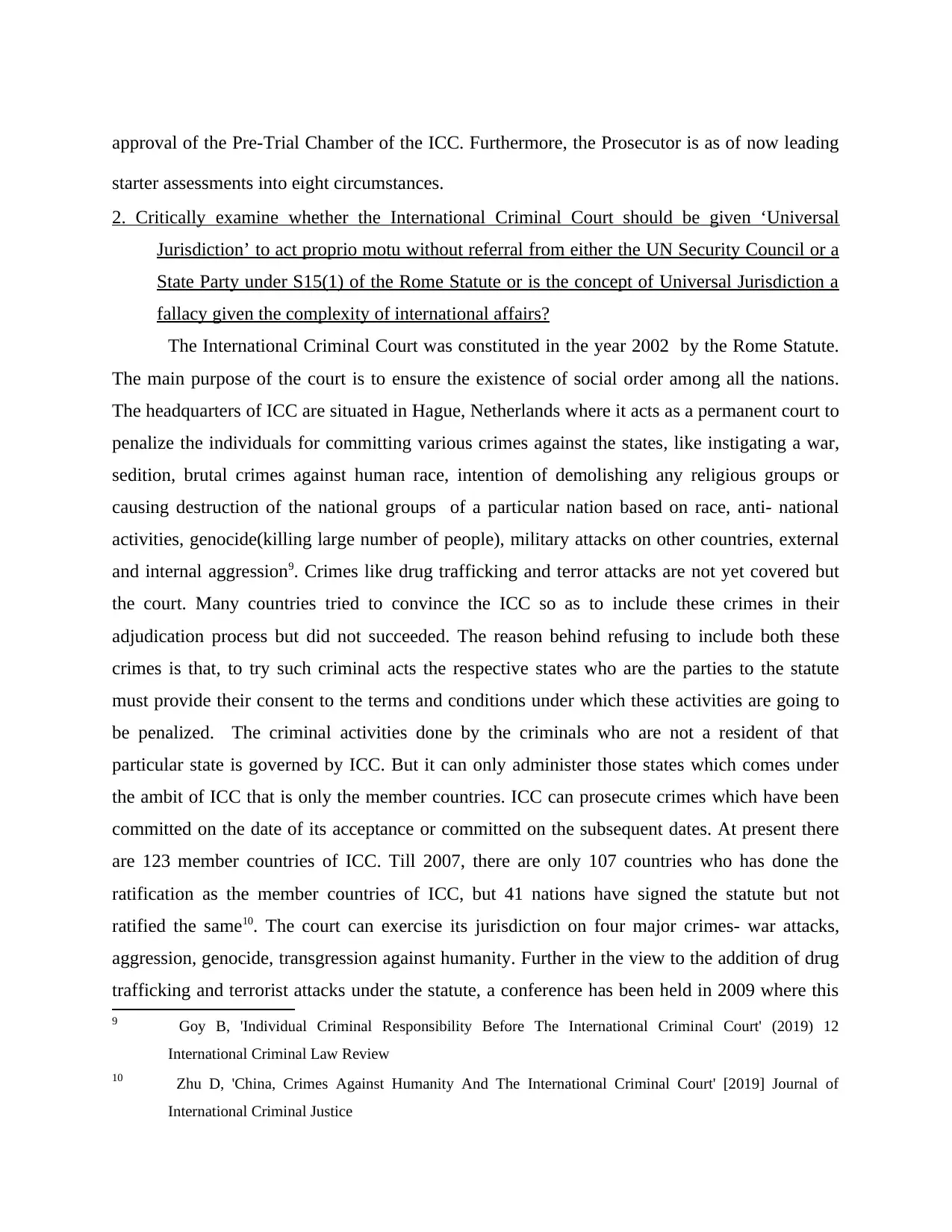
approval of the Pre-Trial Chamber of the ICC. Furthermore, the Prosecutor is as of now leading
starter assessments into eight circumstances.
2. Critically examine whether the International Criminal Court should be given ‘Universal
Jurisdiction’ to act proprio motu without referral from either the UN Security Council or a
State Party under S15(1) of the Rome Statute or is the concept of Universal Jurisdiction a
fallacy given the complexity of international affairs?
The International Criminal Court was constituted in the year 2002 by the Rome Statute.
The main purpose of the court is to ensure the existence of social order among all the nations.
The headquarters of ICC are situated in Hague, Netherlands where it acts as a permanent court to
penalize the individuals for committing various crimes against the states, like instigating a war,
sedition, brutal crimes against human race, intention of demolishing any religious groups or
causing destruction of the national groups of a particular nation based on race, anti- national
activities, genocide(killing large number of people), military attacks on other countries, external
and internal aggression9. Crimes like drug trafficking and terror attacks are not yet covered but
the court. Many countries tried to convince the ICC so as to include these crimes in their
adjudication process but did not succeeded. The reason behind refusing to include both these
crimes is that, to try such criminal acts the respective states who are the parties to the statute
must provide their consent to the terms and conditions under which these activities are going to
be penalized. The criminal activities done by the criminals who are not a resident of that
particular state is governed by ICC. But it can only administer those states which comes under
the ambit of ICC that is only the member countries. ICC can prosecute crimes which have been
committed on the date of its acceptance or committed on the subsequent dates. At present there
are 123 member countries of ICC. Till 2007, there are only 107 countries who has done the
ratification as the member countries of ICC, but 41 nations have signed the statute but not
ratified the same10. The court can exercise its jurisdiction on four major crimes- war attacks,
aggression, genocide, transgression against humanity. Further in the view to the addition of drug
trafficking and terrorist attacks under the statute, a conference has been held in 2009 where this
9 Goy B, 'Individual Criminal Responsibility Before The International Criminal Court' (2019) 12
International Criminal Law Review
10 Zhu D, 'China, Crimes Against Humanity And The International Criminal Court' [2019] Journal of
International Criminal Justice
starter assessments into eight circumstances.
2. Critically examine whether the International Criminal Court should be given ‘Universal
Jurisdiction’ to act proprio motu without referral from either the UN Security Council or a
State Party under S15(1) of the Rome Statute or is the concept of Universal Jurisdiction a
fallacy given the complexity of international affairs?
The International Criminal Court was constituted in the year 2002 by the Rome Statute.
The main purpose of the court is to ensure the existence of social order among all the nations.
The headquarters of ICC are situated in Hague, Netherlands where it acts as a permanent court to
penalize the individuals for committing various crimes against the states, like instigating a war,
sedition, brutal crimes against human race, intention of demolishing any religious groups or
causing destruction of the national groups of a particular nation based on race, anti- national
activities, genocide(killing large number of people), military attacks on other countries, external
and internal aggression9. Crimes like drug trafficking and terror attacks are not yet covered but
the court. Many countries tried to convince the ICC so as to include these crimes in their
adjudication process but did not succeeded. The reason behind refusing to include both these
crimes is that, to try such criminal acts the respective states who are the parties to the statute
must provide their consent to the terms and conditions under which these activities are going to
be penalized. The criminal activities done by the criminals who are not a resident of that
particular state is governed by ICC. But it can only administer those states which comes under
the ambit of ICC that is only the member countries. ICC can prosecute crimes which have been
committed on the date of its acceptance or committed on the subsequent dates. At present there
are 123 member countries of ICC. Till 2007, there are only 107 countries who has done the
ratification as the member countries of ICC, but 41 nations have signed the statute but not
ratified the same10. The court can exercise its jurisdiction on four major crimes- war attacks,
aggression, genocide, transgression against humanity. Further in the view to the addition of drug
trafficking and terrorist attacks under the statute, a conference has been held in 2009 where this
9 Goy B, 'Individual Criminal Responsibility Before The International Criminal Court' (2019) 12
International Criminal Law Review
10 Zhu D, 'China, Crimes Against Humanity And The International Criminal Court' [2019] Journal of
International Criminal Justice
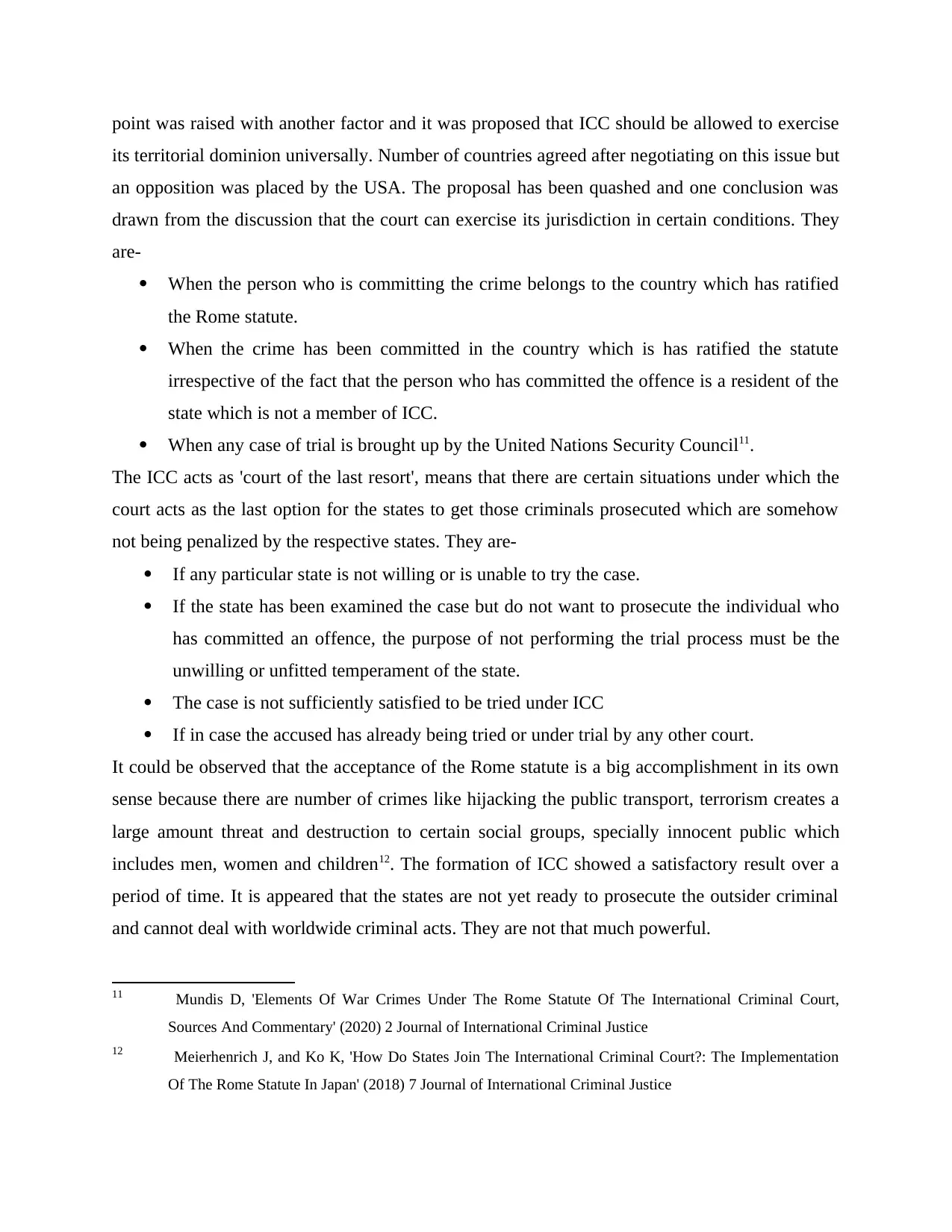
point was raised with another factor and it was proposed that ICC should be allowed to exercise
its territorial dominion universally. Number of countries agreed after negotiating on this issue but
an opposition was placed by the USA. The proposal has been quashed and one conclusion was
drawn from the discussion that the court can exercise its jurisdiction in certain conditions. They
are-
When the person who is committing the crime belongs to the country which has ratified
the Rome statute.
When the crime has been committed in the country which is has ratified the statute
irrespective of the fact that the person who has committed the offence is a resident of the
state which is not a member of ICC.
When any case of trial is brought up by the United Nations Security Council11.
The ICC acts as 'court of the last resort', means that there are certain situations under which the
court acts as the last option for the states to get those criminals prosecuted which are somehow
not being penalized by the respective states. They are-
If any particular state is not willing or is unable to try the case.
If the state has been examined the case but do not want to prosecute the individual who
has committed an offence, the purpose of not performing the trial process must be the
unwilling or unfitted temperament of the state.
The case is not sufficiently satisfied to be tried under ICC
If in case the accused has already being tried or under trial by any other court.
It could be observed that the acceptance of the Rome statute is a big accomplishment in its own
sense because there are number of crimes like hijacking the public transport, terrorism creates a
large amount threat and destruction to certain social groups, specially innocent public which
includes men, women and children12. The formation of ICC showed a satisfactory result over a
period of time. It is appeared that the states are not yet ready to prosecute the outsider criminal
and cannot deal with worldwide criminal acts. They are not that much powerful.
11 Mundis D, 'Elements Of War Crimes Under The Rome Statute Of The International Criminal Court,
Sources And Commentary' (2020) 2 Journal of International Criminal Justice
12 Meierhenrich J, and Ko K, 'How Do States Join The International Criminal Court?: The Implementation
Of The Rome Statute In Japan' (2018) 7 Journal of International Criminal Justice
its territorial dominion universally. Number of countries agreed after negotiating on this issue but
an opposition was placed by the USA. The proposal has been quashed and one conclusion was
drawn from the discussion that the court can exercise its jurisdiction in certain conditions. They
are-
When the person who is committing the crime belongs to the country which has ratified
the Rome statute.
When the crime has been committed in the country which is has ratified the statute
irrespective of the fact that the person who has committed the offence is a resident of the
state which is not a member of ICC.
When any case of trial is brought up by the United Nations Security Council11.
The ICC acts as 'court of the last resort', means that there are certain situations under which the
court acts as the last option for the states to get those criminals prosecuted which are somehow
not being penalized by the respective states. They are-
If any particular state is not willing or is unable to try the case.
If the state has been examined the case but do not want to prosecute the individual who
has committed an offence, the purpose of not performing the trial process must be the
unwilling or unfitted temperament of the state.
The case is not sufficiently satisfied to be tried under ICC
If in case the accused has already being tried or under trial by any other court.
It could be observed that the acceptance of the Rome statute is a big accomplishment in its own
sense because there are number of crimes like hijacking the public transport, terrorism creates a
large amount threat and destruction to certain social groups, specially innocent public which
includes men, women and children12. The formation of ICC showed a satisfactory result over a
period of time. It is appeared that the states are not yet ready to prosecute the outsider criminal
and cannot deal with worldwide criminal acts. They are not that much powerful.
11 Mundis D, 'Elements Of War Crimes Under The Rome Statute Of The International Criminal Court,
Sources And Commentary' (2020) 2 Journal of International Criminal Justice
12 Meierhenrich J, and Ko K, 'How Do States Join The International Criminal Court?: The Implementation
Of The Rome Statute In Japan' (2018) 7 Journal of International Criminal Justice
⊘ This is a preview!⊘
Do you want full access?
Subscribe today to unlock all pages.

Trusted by 1+ million students worldwide
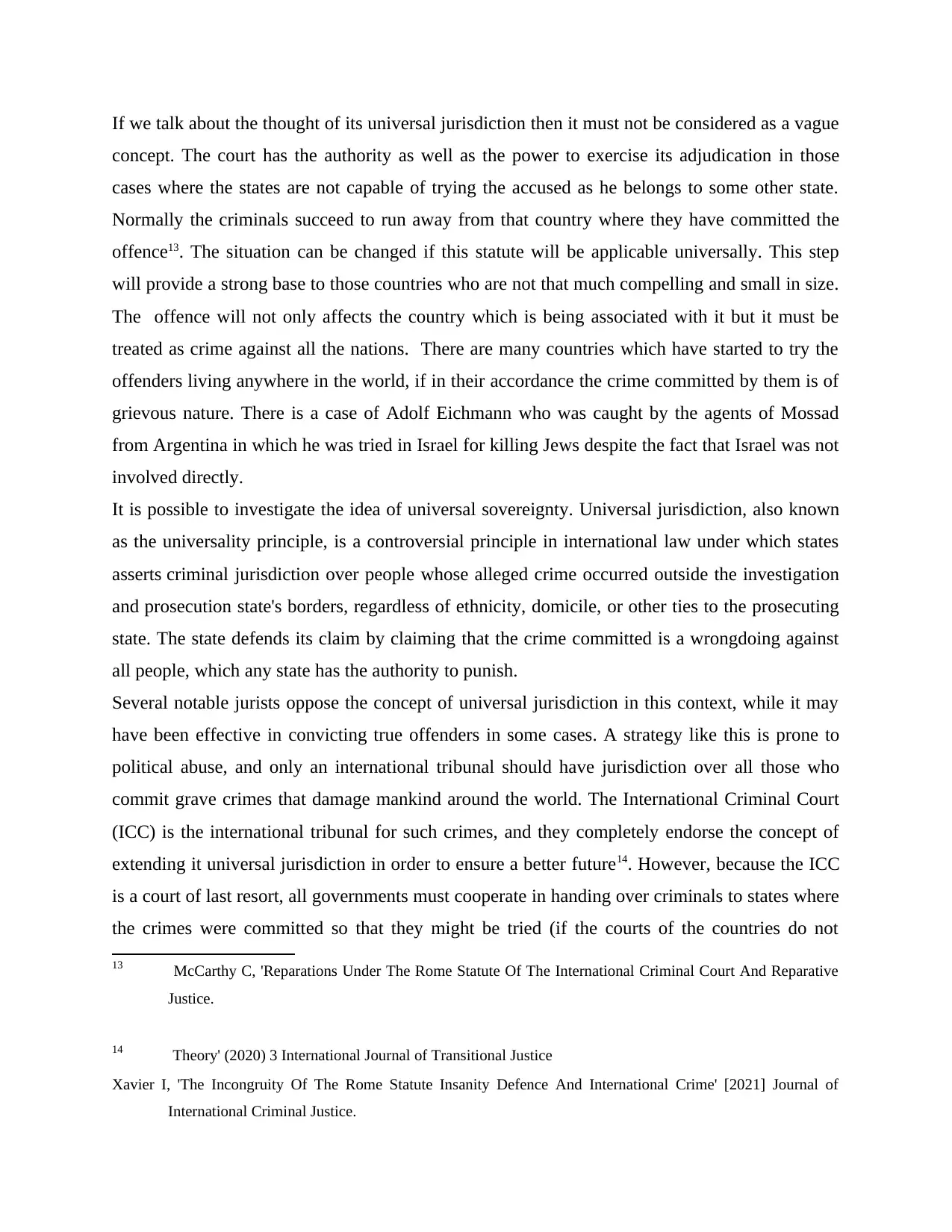
If we talk about the thought of its universal jurisdiction then it must not be considered as a vague
concept. The court has the authority as well as the power to exercise its adjudication in those
cases where the states are not capable of trying the accused as he belongs to some other state.
Normally the criminals succeed to run away from that country where they have committed the
offence13. The situation can be changed if this statute will be applicable universally. This step
will provide a strong base to those countries who are not that much compelling and small in size.
The offence will not only affects the country which is being associated with it but it must be
treated as crime against all the nations. There are many countries which have started to try the
offenders living anywhere in the world, if in their accordance the crime committed by them is of
grievous nature. There is a case of Adolf Eichmann who was caught by the agents of Mossad
from Argentina in which he was tried in Israel for killing Jews despite the fact that Israel was not
involved directly.
It is possible to investigate the idea of universal sovereignty. Universal jurisdiction, also known
as the universality principle, is a controversial principle in international law under which states
asserts criminal jurisdiction over people whose alleged crime occurred outside the investigation
and prosecution state's borders, regardless of ethnicity, domicile, or other ties to the prosecuting
state. The state defends its claim by claiming that the crime committed is a wrongdoing against
all people, which any state has the authority to punish.
Several notable jurists oppose the concept of universal jurisdiction in this context, while it may
have been effective in convicting true offenders in some cases. A strategy like this is prone to
political abuse, and only an international tribunal should have jurisdiction over all those who
commit grave crimes that damage mankind around the world. The International Criminal Court
(ICC) is the international tribunal for such crimes, and they completely endorse the concept of
extending it universal jurisdiction in order to ensure a better future14. However, because the ICC
is a court of last resort, all governments must cooperate in handing over criminals to states where
the crimes were committed so that they might be tried (if the courts of the countries do not
13 McCarthy C, 'Reparations Under The Rome Statute Of The International Criminal Court And Reparative
Justice.
14 Theory' (2020) 3 International Journal of Transitional Justice
Xavier I, 'The Incongruity Of The Rome Statute Insanity Defence And International Crime' [2021] Journal of
International Criminal Justice.
concept. The court has the authority as well as the power to exercise its adjudication in those
cases where the states are not capable of trying the accused as he belongs to some other state.
Normally the criminals succeed to run away from that country where they have committed the
offence13. The situation can be changed if this statute will be applicable universally. This step
will provide a strong base to those countries who are not that much compelling and small in size.
The offence will not only affects the country which is being associated with it but it must be
treated as crime against all the nations. There are many countries which have started to try the
offenders living anywhere in the world, if in their accordance the crime committed by them is of
grievous nature. There is a case of Adolf Eichmann who was caught by the agents of Mossad
from Argentina in which he was tried in Israel for killing Jews despite the fact that Israel was not
involved directly.
It is possible to investigate the idea of universal sovereignty. Universal jurisdiction, also known
as the universality principle, is a controversial principle in international law under which states
asserts criminal jurisdiction over people whose alleged crime occurred outside the investigation
and prosecution state's borders, regardless of ethnicity, domicile, or other ties to the prosecuting
state. The state defends its claim by claiming that the crime committed is a wrongdoing against
all people, which any state has the authority to punish.
Several notable jurists oppose the concept of universal jurisdiction in this context, while it may
have been effective in convicting true offenders in some cases. A strategy like this is prone to
political abuse, and only an international tribunal should have jurisdiction over all those who
commit grave crimes that damage mankind around the world. The International Criminal Court
(ICC) is the international tribunal for such crimes, and they completely endorse the concept of
extending it universal jurisdiction in order to ensure a better future14. However, because the ICC
is a court of last resort, all governments must cooperate in handing over criminals to states where
the crimes were committed so that they might be tried (if the courts of the countries do not
13 McCarthy C, 'Reparations Under The Rome Statute Of The International Criminal Court And Reparative
Justice.
14 Theory' (2020) 3 International Journal of Transitional Justice
Xavier I, 'The Incongruity Of The Rome Statute Insanity Defence And International Crime' [2021] Journal of
International Criminal Justice.
Paraphrase This Document
Need a fresh take? Get an instant paraphrase of this document with our AI Paraphraser
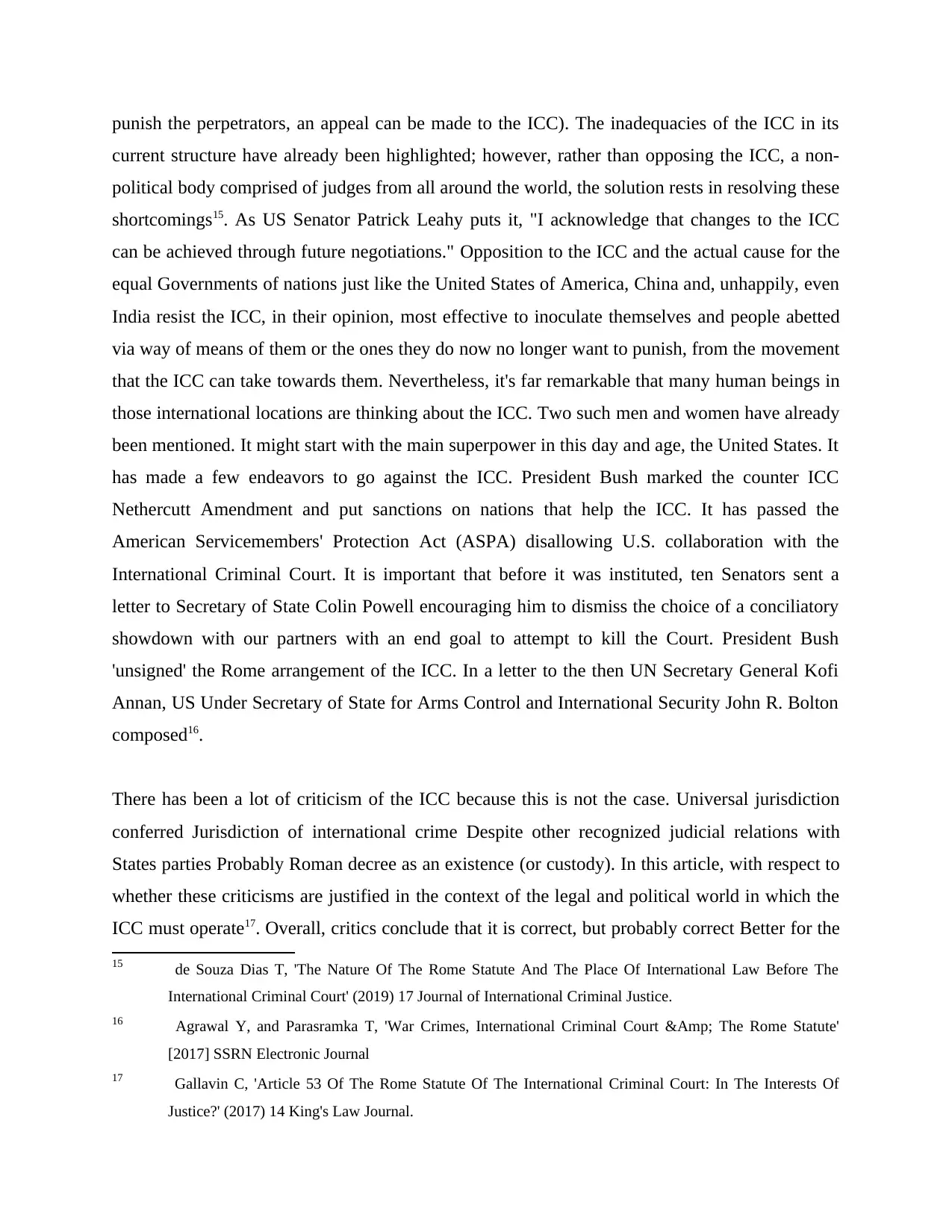
punish the perpetrators, an appeal can be made to the ICC). The inadequacies of the ICC in its
current structure have already been highlighted; however, rather than opposing the ICC, a non-
political body comprised of judges from all around the world, the solution rests in resolving these
shortcomings15. As US Senator Patrick Leahy puts it, "I acknowledge that changes to the ICC
can be achieved through future negotiations." Opposition to the ICC and the actual cause for the
equal Governments of nations just like the United States of America, China and, unhappily, even
India resist the ICC, in their opinion, most effective to inoculate themselves and people abetted
via way of means of them or the ones they do now no longer want to punish, from the movement
that the ICC can take towards them. Nevertheless, it's far remarkable that many human beings in
those international locations are thinking about the ICC. Two such men and women have already
been mentioned. It might start with the main superpower in this day and age, the United States. It
has made a few endeavors to go against the ICC. President Bush marked the counter ICC
Nethercutt Amendment and put sanctions on nations that help the ICC. It has passed the
American Servicemembers' Protection Act (ASPA) disallowing U.S. collaboration with the
International Criminal Court. It is important that before it was instituted, ten Senators sent a
letter to Secretary of State Colin Powell encouraging him to dismiss the choice of a conciliatory
showdown with our partners with an end goal to attempt to kill the Court. President Bush
'unsigned' the Rome arrangement of the ICC. In a letter to the then UN Secretary General Kofi
Annan, US Under Secretary of State for Arms Control and International Security John R. Bolton
composed16.
There has been a lot of criticism of the ICC because this is not the case. Universal jurisdiction
conferred Jurisdiction of international crime Despite other recognized judicial relations with
States parties Probably Roman decree as an existence (or custody). In this article, with respect to
whether these criticisms are justified in the context of the legal and political world in which the
ICC must operate17. Overall, critics conclude that it is correct, but probably correct Better for the
15 de Souza Dias T, 'The Nature Of The Rome Statute And The Place Of International Law Before The
International Criminal Court' (2019) 17 Journal of International Criminal Justice.
16 Agrawal Y, and Parasramka T, 'War Crimes, International Criminal Court &Amp; The Rome Statute'
[2017] SSRN Electronic Journal
17 Gallavin C, 'Article 53 Of The Rome Statute Of The International Criminal Court: In The Interests Of
Justice?' (2017) 14 King's Law Journal.
current structure have already been highlighted; however, rather than opposing the ICC, a non-
political body comprised of judges from all around the world, the solution rests in resolving these
shortcomings15. As US Senator Patrick Leahy puts it, "I acknowledge that changes to the ICC
can be achieved through future negotiations." Opposition to the ICC and the actual cause for the
equal Governments of nations just like the United States of America, China and, unhappily, even
India resist the ICC, in their opinion, most effective to inoculate themselves and people abetted
via way of means of them or the ones they do now no longer want to punish, from the movement
that the ICC can take towards them. Nevertheless, it's far remarkable that many human beings in
those international locations are thinking about the ICC. Two such men and women have already
been mentioned. It might start with the main superpower in this day and age, the United States. It
has made a few endeavors to go against the ICC. President Bush marked the counter ICC
Nethercutt Amendment and put sanctions on nations that help the ICC. It has passed the
American Servicemembers' Protection Act (ASPA) disallowing U.S. collaboration with the
International Criminal Court. It is important that before it was instituted, ten Senators sent a
letter to Secretary of State Colin Powell encouraging him to dismiss the choice of a conciliatory
showdown with our partners with an end goal to attempt to kill the Court. President Bush
'unsigned' the Rome arrangement of the ICC. In a letter to the then UN Secretary General Kofi
Annan, US Under Secretary of State for Arms Control and International Security John R. Bolton
composed16.
There has been a lot of criticism of the ICC because this is not the case. Universal jurisdiction
conferred Jurisdiction of international crime Despite other recognized judicial relations with
States parties Probably Roman decree as an existence (or custody). In this article, with respect to
whether these criticisms are justified in the context of the legal and political world in which the
ICC must operate17. Overall, critics conclude that it is correct, but probably correct Better for the
15 de Souza Dias T, 'The Nature Of The Rome Statute And The Place Of International Law Before The
International Criminal Court' (2019) 17 Journal of International Criminal Justice.
16 Agrawal Y, and Parasramka T, 'War Crimes, International Criminal Court &Amp; The Rome Statute'
[2017] SSRN Electronic Journal
17 Gallavin C, 'Article 53 Of The Rome Statute Of The International Criminal Court: In The Interests Of
Justice?' (2017) 14 King's Law Journal.
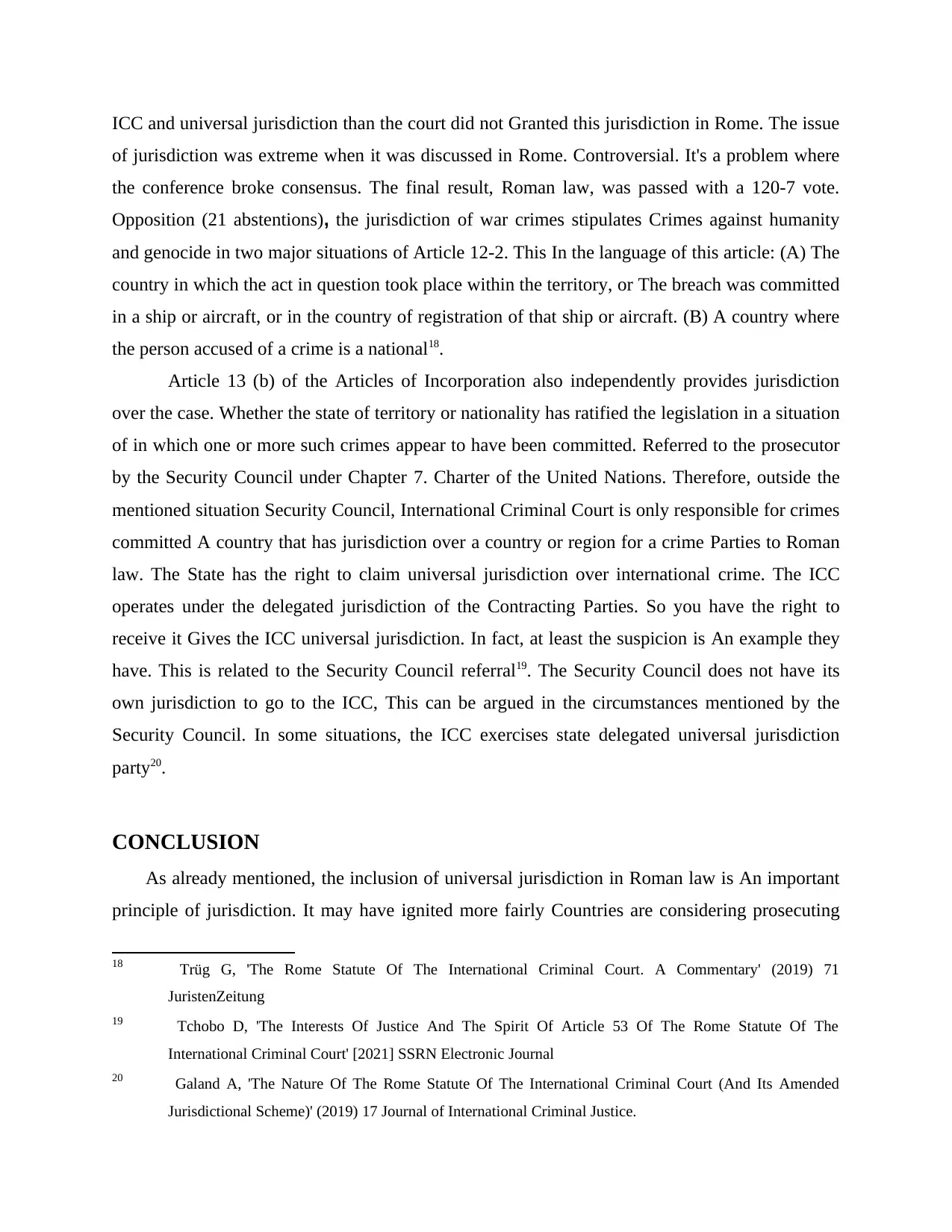
ICC and universal jurisdiction than the court did not Granted this jurisdiction in Rome. The issue
of jurisdiction was extreme when it was discussed in Rome. Controversial. It's a problem where
the conference broke consensus. The final result, Roman law, was passed with a 120-7 vote.
Opposition (21 abstentions), the jurisdiction of war crimes stipulates Crimes against humanity
and genocide in two major situations of Article 12-2. This In the language of this article: (A) The
country in which the act in question took place within the territory, or The breach was committed
in a ship or aircraft, or in the country of registration of that ship or aircraft. (B) A country where
the person accused of a crime is a national18.
Article 13 (b) of the Articles of Incorporation also independently provides jurisdiction
over the case. Whether the state of territory or nationality has ratified the legislation in a situation
of in which one or more such crimes appear to have been committed. Referred to the prosecutor
by the Security Council under Chapter 7. Charter of the United Nations. Therefore, outside the
mentioned situation Security Council, International Criminal Court is only responsible for crimes
committed A country that has jurisdiction over a country or region for a crime Parties to Roman
law. The State has the right to claim universal jurisdiction over international crime. The ICC
operates under the delegated jurisdiction of the Contracting Parties. So you have the right to
receive it Gives the ICC universal jurisdiction. In fact, at least the suspicion is An example they
have. This is related to the Security Council referral19. The Security Council does not have its
own jurisdiction to go to the ICC, This can be argued in the circumstances mentioned by the
Security Council. In some situations, the ICC exercises state delegated universal jurisdiction
party20.
CONCLUSION
As already mentioned, the inclusion of universal jurisdiction in Roman law is An important
principle of jurisdiction. It may have ignited more fairly Countries are considering prosecuting
18 Trüg G, 'The Rome Statute Of The International Criminal Court. A Commentary' (2019) 71
JuristenZeitung
19 Tchobo D, 'The Interests Of Justice And The Spirit Of Article 53 Of The Rome Statute Of The
International Criminal Court' [2021] SSRN Electronic Journal
20 Galand A, 'The Nature Of The Rome Statute Of The International Criminal Court (And Its Amended
Jurisdictional Scheme)' (2019) 17 Journal of International Criminal Justice.
of jurisdiction was extreme when it was discussed in Rome. Controversial. It's a problem where
the conference broke consensus. The final result, Roman law, was passed with a 120-7 vote.
Opposition (21 abstentions), the jurisdiction of war crimes stipulates Crimes against humanity
and genocide in two major situations of Article 12-2. This In the language of this article: (A) The
country in which the act in question took place within the territory, or The breach was committed
in a ship or aircraft, or in the country of registration of that ship or aircraft. (B) A country where
the person accused of a crime is a national18.
Article 13 (b) of the Articles of Incorporation also independently provides jurisdiction
over the case. Whether the state of territory or nationality has ratified the legislation in a situation
of in which one or more such crimes appear to have been committed. Referred to the prosecutor
by the Security Council under Chapter 7. Charter of the United Nations. Therefore, outside the
mentioned situation Security Council, International Criminal Court is only responsible for crimes
committed A country that has jurisdiction over a country or region for a crime Parties to Roman
law. The State has the right to claim universal jurisdiction over international crime. The ICC
operates under the delegated jurisdiction of the Contracting Parties. So you have the right to
receive it Gives the ICC universal jurisdiction. In fact, at least the suspicion is An example they
have. This is related to the Security Council referral19. The Security Council does not have its
own jurisdiction to go to the ICC, This can be argued in the circumstances mentioned by the
Security Council. In some situations, the ICC exercises state delegated universal jurisdiction
party20.
CONCLUSION
As already mentioned, the inclusion of universal jurisdiction in Roman law is An important
principle of jurisdiction. It may have ignited more fairly Countries are considering prosecuting
18 Trüg G, 'The Rome Statute Of The International Criminal Court. A Commentary' (2019) 71
JuristenZeitung
19 Tchobo D, 'The Interests Of Justice And The Spirit Of Article 53 Of The Rome Statute Of The
International Criminal Court' [2021] SSRN Electronic Journal
20 Galand A, 'The Nature Of The Rome Statute Of The International Criminal Court (And Its Amended
Jurisdictional Scheme)' (2019) 17 Journal of International Criminal Justice.
⊘ This is a preview!⊘
Do you want full access?
Subscribe today to unlock all pages.

Trusted by 1+ million students worldwide
1 out of 14
Related Documents
Your All-in-One AI-Powered Toolkit for Academic Success.
+13062052269
info@desklib.com
Available 24*7 on WhatsApp / Email
![[object Object]](/_next/static/media/star-bottom.7253800d.svg)
Unlock your academic potential
Copyright © 2020–2026 A2Z Services. All Rights Reserved. Developed and managed by ZUCOL.





